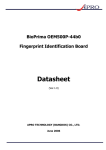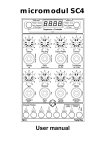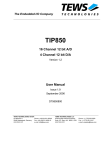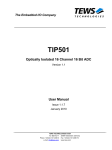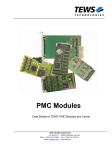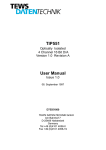Download User Manual - TEWS TECHNOLOGIES
Transcript
The Embedded I/O Company TPMC550-SW-65 Windows Device Driver 8/4 Channels of Isolated 12-Bit D/A Version 2.0.x User Manual Issue 2.0.0 June 2011 TEWS TECHNOLOGIES GmbH Am Bahnhof 7 25469 Halstenbek, Germany Phone: +49 (0) 4101 4058 0 Fax: +49 (0) 4101 4058 19 e-mail: [email protected] www.tews.com TPMC550-SW-65 This document contains information, which is proprietary to TEWS TECHNOLOGIES GmbH. Any reproduction without written permission is forbidden. Windows Device Driver 8/4 Channels of Isolated 12-Bit D/A TEWS TECHNOLOGIES GmbH has made any effort to ensure that this manual is accurate and complete. However TEWS TECHNOLOGIES GmbH reserves the right to change the product described in this document at any time without notice. Supported Modules: TPMC550 TEWS TECHNOLOGIES GmbH is not liable for any damage arising out of the application or use of the device described herein. 2003-2011 by TEWS TECHNOLOGIES GmbH Issue Description Date 1.0 First Issue March 28, 2003 1.0.1 General revision, new address TEWS LLC November 11, 2008 2.0.0 Windows7 support and API functions added June 14, 2011 TPMC550-SW-65 – Windows Device Driver Page 2 of 31 Table of Contents 1 2 INTRODUCTION......................................................................................................... 4 INSTALLATION.......................................................................................................... 5 2.1 Software Installation .......................................................................................................................5 2.1.1 Windows 2000 / XP..............................................................................................................5 2.1.2 Windows 7............................................................................................................................6 2.2 Confirming Driver Installation .......................................................................................................6 3 API DOCUMENTATION ............................................................................................. 7 3.1 General Functions...........................................................................................................................7 3.1.1 tpmc550Open.......................................................................................................................7 3.1.2 tpmc550Close ......................................................................................................................9 3.2 Device Access Functions.............................................................................................................11 3.2.1 tpmc550DacWrite...............................................................................................................11 3.2.2 tpmc550DacWriteMulti .......................................................................................................13 3.2.3 tpmc550SeqSetup..............................................................................................................15 3.2.4 tpmc550SeqStart ...............................................................................................................18 3.2.5 tpmc550SeqStop................................................................................................................20 3.2.6 tpmc550SeqWrite...............................................................................................................22 3.2.7 tpmc550SeqFlush ..............................................................................................................25 3.2.8 tpmc550SeqStatus.............................................................................................................27 3.2.9 tpmc550GetModuleInfo......................................................................................................30 TPMC550-SW-65 – Windows Device Driver Page 3 of 31 1 Introduction The TPMC550-SW-65 Windows device driver is a kernel mode driver which allows the operation of supported hardware modules on an Intel or Intel-compatible Windows operating system. Supported Windows versions are: Windows 2000 Windows XP Windows XP Embedded Windows 7 (32bit and 64bit) The TPMC550-SW-65 device driver supports the following features: writing and converting D/A values to a specified channel simultaneous D/A conversion on selected channels sequencer facility with configurable software ring buffer reading module configuration (voltage range and correction data) The TPMC550-SW-65 supports the modules listed below: TPMC550 8/4 Channels of Isolated 12 bit D/A PMC To get more information about the features and use of TPMC550 devices it is recommended to read the manuals listed below. TPMC550 User manual TPMC550-SW-65 – Windows Device Driver Page 4 of 31 2 Installation Following files are located in directory TPMC550-SW-65 on the distribution media: i386\ amd64\ installer_32bit.exe installer_64bit.exe tpmc550.inf tpmc550.h example\tpmc550exa.c api\tpmc550api.c api\tpmc550api.h TPMC550-SW-65-2.0.0.pdf Release.txt ChangeLog.txt Directory containing driver files for 32bit Windows versions Directory containing driver files for 64bit Windows versions Installation tool for 32bit systems (Windows XP or later) Installation tool for 64bit systems (Windows XP or later) Windows installation script Header file with IOCTL codes and structure definitions Example application Application Programming Interface source Application Programming Interface header This document Information about the Device Driver Release Release history 2.1 Software Installation 2.1.1 Windows 2000 / XP This section describes how to install the TPMC550 Device Driver on a Windows 2000 / XP operating system. After installing the TPMC550 card(s) and boot-up your system, Windows 2000 / XP setup will show a "New hardware found" dialog box. 1. The "Upgrade Device Driver Wizard" dialog box will appear on your screen. Click "Next" button to continue. 2. In the following dialog box, choose "Search for a suitable driver for my device". Click "Next" button to continue. 3. Insert the TPMC550 driver media; select "Disk Drive" in the dialog box. Click "Next" button to continue. 4. Now the driver wizard should find a suitable device driver on the media. Click "Next" button to continue. 5. Complete the upgrade device driver and click "Finish" to take all the changes effect. 6. Now copy all needed files (tpmc550.h and API files) to the desired target directories. After successful installation the TPMC550 device driver will start immediately and creates devices (TPMC550_1, TPMC550_2 ...) for all recognized TPMC550 modules. TPMC550-SW-65 – Windows Device Driver Page 5 of 31 2.1.2 Windows 7 This section describes how to install the TPMC550-SW-65 Device Driver on a Windows 7 (32bit or 64bit) operating system. Depending on the operating system type, execute the installer binaries for either 32bit or 64bit systems. This will install all required driver files using an installation wizard. Copy needed files (tpmc550.h and API files) to desired target directory. After successful installation a device is created for each module found (TPMC550_1, TPMC550_2 ...). 2.2 Confirming Driver Installation To confirm that the driver has been properly loaded, perform the following steps: 1. Open the Windows Device Manager: a. For Windows 2000 / XP, open the "Control Panel" from "My Computer" and click the "System" icon and choose the "Hardware" tab, and then click the "Device Manager" button. b. For Windows 7, open the "Control Panel" from "My Computer" and then click the "Device Manager" entry. 2. Click the "+" in front of "Embedded I/O". The driver "TEWS TECHNOLOGIES – TPMC550 8(4) Channel 12-Bit D/A (TPMC550)" should appear for each installed device. TPMC550-SW-65 – Windows Device Driver Page 6 of 31 3 API Documentation 3.1 General Functions 3.1.1 tpmc550Open NAME tpmc550Open – Opens a Device SYNOPSIS TPMC550_HANDLE tpmc550Open ( char *DeviceName ); DESCRIPTION Before I/O can be performed to a device, a file descriptor must be opened by a call to this function. PARAMETERS DeviceName This parameter points to a null-terminated string that specifies the name of the device. EXAMPLE #include “tpmc550api.h” TPMC550_HANDLE hdl; /* ** open file descriptor to device */ hdl = tpmc550Open(“\\\\.\\TPMC550_1” ); if (hdl == NULL) { /* handle open error */ } TPMC550-SW-65 – Windows Device Driver Page 7 of 31 RETURNS A device handle, or NULL if the function fails. To get extended error information, call GetLastError. ERROR CODES All error codes are standard error codes set by the I/O system. TPMC550-SW-65 – Windows Device Driver Page 8 of 31 3.1.2 tpmc550Close NAME tpmc550Close – Closes a Device SYNOPSIS TPMC550_STATUS tpmc550Close ( TPMC550_HANDLE ); hdl DESCRIPTION This function closes previously opened devices. PARAMETERS hdl This value specifies the device handle to the hardware module retrieved by a call to the corresponding open-function. EXAMPLE #include “tpmc550api.h” TPMC550_HANDLE hdl; TPMC550_STATUS result; /* ** close file descriptor to device */ result = tpmc550Close( hdl ); if (result != TPMC550_OK) { /* handle close error */ } TPMC550-SW-65 – Windows Device Driver Page 9 of 31 RETURNS On success TPMC550_OK, or an appropriate error code. ERROR CODES All error codes are standard error codes set by the I/O system. TPMC550-SW-65 – Windows Device Driver Page 10 of 31 3.2 Device Access Functions 3.2.1 tpmc550DacWrite NAME tpmc550DacWrite – write D/A value to specified channel SYNOPSIS TPMC550_STATUS tpmc550DacWrite ( TPMC550_HANDLE hdl, int channel, unsigned int flags, short value ); DESCRIPTION This function writes a new value to a specific channel and starts D/A conversion immediately in transparent mode PARAMETERS hdl This argument specifies the device handle to the hardware module retrieved by a call to the corresponding open-function. channel This argument specifies the DAC channel which shall be updated. Possible values are 1 up to the number of available DAC channels of the specific module. flags This argument specifies a set of bit flags that control the D/A conversion: Value Description TPMC550_CORR Perform an offset and gain correction with factory calibration data stored in the TPMC550 EEPROM. value This argument specifies the new 12-bit D/A value. Valid data range depends on the voltage range of the specified channel (0…4095 for 0...10V voltage range and -2048…2047 for +/-10V voltage range). TPMC550-SW-65 – Windows Device Driver Page 11 of 31 EXAMPLE #include “tpmc550api.h” TPMC550_HANDLE TPMC550_STATUS hdl; result; result = tpmc550DacWrite(hdl, 1, TPMC550_CORR, 1234); if (result != TPMC550_OK) { /* handle error */ } RETURNS On success, TPMC550_OK is returned. In the case of an error, the appropriate error code is returned by the function. ERROR CODES TPMC550_ERR_INVALID_HANDLE The specified TPMC550_HANDLE is invalid. TPMC550_ERR_RANGE Invalid channel number TPMC550_ERR_TIMEOUT Timeout during D/A conversion TPMC550_ERR_BUSY This error occurs if the sequencer is still running. Please stop the sequencer before executing this function. TPMC550-SW-65 – Windows Device Driver Page 12 of 31 3.2.2 tpmc550DacWriteMulti NAME tpmc550DacWriteMulti – write D/A value to multiple channels SYNOPSIS TPMC550_STATUS tpmc550DacWriteMulti ( TPMC550_HANDLE hdl, unsigned int ChannelMask, unsigned int flags, short values[MAX_CHAN] ); DESCRIPTION This function writes new values to specified channels and starts D/A conversion immediately (transparent mode) or simultaneously (latched mode). PARAMETERS hdl This argument specifies the device handle to the hardware module retrieved by a call to the corresponding open-function. ChannelMask This argument selects DAC channels which shall be updated. A set (1) bit specifies that the corresponding channel shall be updated. Bit 0 corresponds to the first DAC channel, bit 1 corresponds to the second DAC channel and so on. flags This argument specifies a set of bit flags that control the D/A conversion: Value Description TPMC550_CORR Perform an offset and gain correction with factory calibration data stored in the TPMC550 EEPROM for all selected channels. TPMC550_SIMCONV Start conversion of selected channels in latched mode and update analog outputs simultaneously. values This array contains the new 12-bit D/A values. Valid data range depends on the voltage range of the specified channel (0…4095 for 0...10V voltage range and -2048…2047 for +/-10V voltage range). TPMC550-SW-65 – Windows Device Driver Page 13 of 31 Array index 0 corresponds to the first DAC channel, array index 1 corresponds to the second DAC channel and so on. Only channels selected for update (ChannelMask) will be modified. EXAMPLE #include “tpmc550api.h” TPMC550_HANDLE TPMC550_STATUS unsigned int unsigned int short hdl; result; ChannelMask; flags; values[MAX_CHAN]; // Update channel 1, 4 and 8 simultaneously with corrected D/A values ChannelMask = (1<<0) | (1<<3) | (1<<7); flags = TPMC550_CORR | TPMC550_SIMCONV; value[0] = 111; // channel 1 value[3] = 444; // channel 4 value[7] = 888; // channel 8 result = tpmc550DacWriteMulti(hdl, ChannelMask, flags, values); if (result != TPMC550_OK) { /* handle error */ } RETURNS On success, TPMC550_OK is returned. In the case of an error, the appropriate error code is returned by the function. ERROR CODES TPMC550_ERR_INVALID_HANDLE The specified TPMC550_HANDLE is invalid. TPMC550_ERR_RANGE Invalid channel number TPMC550_ERR_TIMEOUT Timeout during D/A conversion TPMC550_ERR_BUSY This error occurs if the sequencer is still running. Please stop the sequencer before executing this function. TPMC550-SW-65 – Windows Device Driver Page 14 of 31 3.2.3 tpmc550SeqSetup NAME tpmc550SeqSetup – Setup sequencer facility SYNOPSIS TPMC550_STATUS tpmc550SeqSetup ( TPMC550_HANDLE hdl, int CycleTime, int NumActiveChannels, int NumBufTuples, int ChannelAllocation[MAX_CHAN], unsigned int flags ); DESCRIPTION This function configures the sequencer facility and allocates memory for the sequencer software ring buffer. The behaviour of the sequencer facility is controlled by a set of bit flags which are described below. Basically the sequencer will perform a D/A conversion on active channels in a deterministic time period controlled by a cycle timer or the duration of the conversion itself. To be sure that D/A data will be available for the next cycle just in-time, data for the sequencer will be provided by a configurable ring buffer. The ring buffer can be asynchronously filled by the application program. The sequencer facility provides two operating modes. In loop mode (TPMC550_LOOP) the buffer will be filled completely with new data (e.g. wave form). The contents of the buffer will be output continuously in a loop. In normal mode (TPMC550_LOOP is not set) the application program must provide new data for every cycle. If the buffer is empty then the sequencer will stop and it holds the last output value until new data arrives. PARAMETERS hdl This argument specifies the device handle to the hardware module retrieved by a call to the corresponding open-function. CycleTime This argument specifies the sequencer cycle time in steps of 100 µs. This argument is only relevant if the flag TPMC550_TIMERMODE is set. NumActiveChannels This argument specifies the number of active channels. Valid range is 1 up to the number of available channels (4 or 8). TPMC550-SW-65 – Windows Device Driver Page 15 of 31 NumBufTuples This argument specifies the size of the sequencer software ring buffer. In this case size is not the number of bytes to allocate but rather the number of tuples (data for all active channels per cycle). ChannelAllocation This argument specifies the channel number of active channels and their enumeration inside a tuple. The function tpmc550SeqWrite awaits new data for active channels in this order. The first array element contains the channel number (1..n) of the first active channel. The second array element the channel number of the second active channel and so forth. Unused array elements can be left undefined. flags This argument specifies a set of bit flags that control the sequencer operation: Value Description TPMC550_TIMERMODE If set, the cycle of D/A conversions will be controlled by the sequencer timer in steps of 100 microseconds; otherwise the sequencer will run in continuous mode as fast as possible (based on the conversion time). TPMC550_LOOP If this flag is set (loop mode) the ring buffer never becomes empty. Once completely filled the sequencer will continuously get data out of the buffer for the next conversion. If this flag is not set (normal mode) and the buffer becomes empty then the sequencer will stop and it holds the last output value until new data arrives. TPMC550_CORR Perform an offset and gain correction with factory calibration data stored in the TPMC550 EEPROM for all selected channels. TPMC550_SIMCONV Start conversion of active channels in latched mode and update analog outputs simultaneously. EXAMPLE #include “tpmc550api.h” TPMC550_HANDLE TPMC550_STATUS int unsigned int hdl; result; ChannelAllocation[MAX_CHAN]; flags; // Setup the sequencer with 2 active channels (1 and 4) in timer mode with // 1 ms cycle time. The sequencer buffer shall store data tuples for // up to 100 cycles. ChannelAllocation[0] = 1; TPMC550-SW-65 – Windows Device Driver Page 16 of 31 ChannelAllocation[1] = 4; flags = TPMC550_TIMERMODE | TPMC550_CORR | TPMC550_SIMCONV; result = tpmc550SeqSetup(hdl, 10, 2, 100, ChannelAllocation, flags); if (result != TPMC550_OK) { /* handle error */ } RETURNS On success, TPMC550_OK is returned. In the case of an error, the appropriate error code is returned by the function. ERROR CODES TPMC550_ERR_INVALID_HANDLE The specified TPMC550_HANDLE is invalid. TPMC550_ERR_RANGE Invalid channel number or invalid number of channels. TPMC550_ERR_NOMEM Unable to allocate memory for the ring buffer. TPMC550_ERR_BUSY This error occurs if the sequencer is still running. Please stop the sequencer before executing this function. TPMC550-SW-65 – Windows Device Driver Page 17 of 31 3.2.4 tpmc550SeqStart NAME tpmc550SeqStart – start sequencer facility SYNOPSIS TPMC550_STATUS tpmc550SeqStart ( TPMC550_HANDLE hdl ); DESCRIPTION This function starts the sequencer facility. Before calling this function the sequencer must be setup with tpmc550SeqSetup und the ring buffer must be filled with tpmc550SeqWrite. PARAMETERS hdl This argument specifies the device handle to the hardware module retrieved by a call to the corresponding open-function. EXAMPLE #include “tpmc550api.h” TPMC550_HANDLE TPMC550_STATUS hdl; result; // start the seuencer result = tpmc550SeqStart(hdl); if (result != TPMC550_OK) { /* handle error */ } TPMC550-SW-65 – Windows Device Driver Page 18 of 31 RETURNS On success, TPMC550_OK is returned. In the case of an error, the appropriate error code is returned by the function. ERROR CODES TPMC550_ERR_INVALID_HANDLE The specified TPMC550_HANDLE is invalid. TPMC550_ERR_NOT_READY The sequencer facility was not properly configured. Execute the function tpmc550SeqSetup first. TPMC550_ERR_NODATA No data is available in the ring buffer to start the sequencer facility. Use the function tpmc550SeqWrite to write at least one data tuple before starting the sequencer. TPMC550-SW-65 – Windows Device Driver Page 19 of 31 3.2.5 tpmc550SeqStop NAME tpmc550SeqStop – stop the sequencer facility SYNOPSIS TPMC550_STATUS tpmc550SeqStop ( TPMC550_HANDLE hdl ); DESCRIPTION This function stops the sequencer facility. All allocated resources (e.g. ring buffer memory) will be freed. PARAMETERS hdl This argument specifies the device handle to the hardware module retrieved by a call to the corresponding open-function. EXAMPLE #include “tpmc550api.h” TPMC550_HANDLE TPMC550_STATUS hdl; result; // stop the sequencer result = tpmc550SeqStop(hdl); if (result != TPMC550_OK) { /* handle error */ } TPMC550-SW-65 – Windows Device Driver Page 20 of 31 RETURNS On success, TPMC550_OK is returned. In the case of an error, the appropriate error code is returned by the function. ERROR CODES TPMC550_ERR_INVALID_HANDLE TPMC550-SW-65 – Windows Device Driver The specified TPMC550_HANDLE is invalid. Page 21 of 31 3.2.6 tpmc550SeqWrite NAME tpmc550SeqWrite – write new sequencer data SYNOPSIS TPMC550_STATUS tpmc550SeqWrite ( TPMC550_HANDLE hdl, int size, short *values, int *WrittenSize ); DESCRIPTION This function writes new data to the sequencers data buffer. The provided data buffer must always contain new data for all active channels (tuple). The number of tuples per write must be at least one up to “unlimited”. This function will always write as many tuples as possible. If the buffer becomes full the function will return immediately with the error TPMC550_ERR_BUF_FULL. The number of written bytes will be returned in a variable pointed to by WrittenSize. PARAMETERS hdl This argument specifies the device handle to the hardware module retrieved by a call to the corresponding open-function. size This argument specifies the size (in bytes) of the data buffer to write. values This argument is a pointer to an array of short variables that contains data for all active channels for at least one sequencer cycle (tuple). Despite of the declaration as simple short pointer this array is treated as a two-dimensional array with variable dimensions. The rows of the array represent the number of tuples and the columns the number of active channels. A declaration of this array will look like this: data[tuples][channels]. WrittenSize This argument is a pointer to an int variable where the number of written bytes is returned. In case of the error TPMC550_ERR_BUF_FULL this value can be used to adjust the buffer start pointer for subsequent writes. TPMC550-SW-65 – Windows Device Driver Page 22 of 31 EXAMPLE #include “tpmc550api.h” TPMC550_HANDLE TPMC550_STATUS int short short hdl; result; WrittenSize; ForOneCycle[4]; ForHundredCycles[100][4]; // Fill new data into the data buffers ForHundredCycles[0][0] = 1; // first cycle, first channel ForHundredCycles[0][1] = 2; // first cycle, second channel // ... ForHundredCycles[1][0] = 11; // second cycle, first channel // ... ForHundredCycles[99][3] = 1234; // 100th cycle, last channel // Write new data for 100 cycles and 4 active channels (100 * 4 values) result = tpmc550SeqWrite( hdl, sizeof(ForHundredCycles), (short*)ForHundredCycles, &WrittenSize ); if (result != TPMC550_OK) { /* handle error */ if (result == TPMC550_ERR_BUF_FULL) { /* send remaining data later */ } } // Write new data for 1 cycle and 4 active channels (4 values) result = tpmc550SeqWrite( hdl, sizeof(ForOneCycle), ForOneCycle, &WrittenSize ); TPMC550-SW-65 – Windows Device Driver Page 23 of 31 RETURNS On success, TPMC550_OK is returned. In the case of an error, the appropriate error code is returned by the function. ERROR CODES TPMC550_ERR_INVALID_HANDLE The specified TPMC550_HANDLE is invalid. TPMC550_ERR_NOT_READY The sequencer is not running TPMC550_ERR_BUF_TOO_SMALL The buffer does not contain enough data for all active channels. TPMC550_ERR_NOMEM The passed data buffer does not fit into the configured sequencer buffer. This error is only relevant in loop mode (TPMC550_LOOP) TPMC550_ERR_BUF_FULL The sequencer buffer is full. Not all data was written to the buffer. Use the contents of WrittenSize to adjust the data pointer to write the remaining data tuples. TPMC550-SW-65 – Windows Device Driver Page 24 of 31 3.2.7 tpmc550SeqFlush NAME tpmc550SeqFlush – flush the sequencer ring buffer SYNOPSIS TPMC550_STATUS tpmc550SeqFlush ( TPMC550_HANDLE hdl ); DESCRIPTION This function flushes the ring buffer of the sequencer facility. The analog output of active channels will hold the last converted data until new data is written with the tpmc550SeqWrite function. PARAMETERS hdl This argument specifies the device handle to the hardware module retrieved by a call to the corresponding open-function. EXAMPLE #include “tpmc550api.h” TPMC550_HANDLE TPMC550_STATUS hdl; result; // flush the sequencer ring buffer result = tpmc550SeqFlush(hdl); if (result != TPMC550_OK) { /* handle error */ } TPMC550-SW-65 – Windows Device Driver Page 25 of 31 RETURNS On success, TPMC550_OK is returned. In the case of an error, the appropriate error code is returned by the function. ERROR CODES TPMC550_ERR_INVALID_HANDLE TPMC550-SW-65 – Windows Device Driver The specified TPMC550_HANDLE is invalid. Page 26 of 31 3.2.8 tpmc550SeqStatus NAME tpmc550SeqStatus – get sequencer status and statistic information SYNOPSIS TPMC550_STATUS tpmc550SeqStatus ( TPMC550_HANDLE hdl, int *OperatingState, int *status, int *CycleCount, int *UnderflowCount, int *EmptyCount ); DESCRIPTION This function reads sequencer status and statistic information from the specified device. PARAMETERS hdl This argument specifies the device handle to the hardware module retrieved by a call to the corresponding open-function. OperatingState This argument is a pointer to an int variable where the current operating state of the sequencer is returned. Possible operating states are: Value Description TPMC550_STOPPED The sequencer is stopped. TPMC550_READY The sequencer facility is configured and ready to start. TPMC550_RUNNING The sequencer is running. TPMC550-SW-65 – Windows Device Driver Page 27 of 31 status This argument is a pointer to an int variable where current error/status of the sequencer is returned. After calling this function the error/status code will be set to TPMC550_SEQ_OK. Possible error/status codes are: Value Description TPMC550_SEQ_OK Sequencer is working fine. No errors detected. TPMC550_SEQ_UNDERFLOW The sequencer hardware has detected a data underflow condition. The driver was not able to provide new data within a sequencer timer cycle. TPMC550_SEQ_NODATA No data available in the ring buffer for output. CycleCount This argument is a pointer to an int variable where the total number of sequencer cycles since sequencer start is returned. UnderflowCount This argument is a pointer to an int variable where the total number of sequencer underflows since sequencer start is returned. EmptyCount This argument is a pointer to an int variable where the total number of empty buffer cycles since sequencer start is returned. EXAMPLE #include “tpmc550api.h” TPMC550_HANDLE TPMC550_STATUS int int int int int hdl; result; OperatingState; status; CycleCount; UnderflowCount; EmptyCount; // Read sequencer status and statistic information result = tpmc550SeqStatus(hdl, &OperatingState, &status, &CycleCount, &UnderflowCount, &EmptyCount); if (result != TPMC550_OK) { /* handle error */ } TPMC550-SW-65 – Windows Device Driver Page 28 of 31 RETURNS On success, TPMC550_OK is returned. In the case of an error, the appropriate error code is returned by the function. ERROR CODES TPMC550_ERR_INVALID_HANDLE TPMC550-SW-65 – Windows Device Driver The specified TPMC550_HANDLE is invalid. Page 29 of 31 3.2.9 tpmc550GetModuleInfo NAME tpmc550GetModuleInfo – Get module information SYNOPSIS TPMC550_STATUS tpmc550GetModuleInfo ( TPMC550_HANDLE hdl, int *NumChan, int bipolar[MAX_CHAN], char OffsCorr[MAX_CHAN], char GainCorr[MAX_CHAN] ); DESCRIPTION This function reads module information data from the specified device. PARAMETERS hdl This argument specifies the device handle to the hardware module retrieved by a call to the corresponding open-function. NumChan This argument is a pointer to an int variable where the number of available DAC channels is returned. bipolar This argument is a pointer to an int array where the configured voltage range of each DAC channel is returned as boolean value. The array element bipolar[0] contains the range stetting for DAC channel 1, bipolar[1] for DAC channel 2 and so forth. If the corresponding value is TRUE then the voltage range of the channel is configured to +/- 10V output (bipolar); otherwise it is configured to 0…10V output voltage range. OffsCorr This argument is a pointer to a char array where the factory programmed offset correction data is returned. OffsCorr[0] contains correction data for DAC channel 1, OffsCorr[1] for DAC channel 2 and so forth. GainCorr This argument is a pointer to a char array where the factory programmed gain correction data are returned. GainCorr[0] contains correction data for DAC channel 1, GainCorr[1] for DAC channel 2 and so forth. TPMC550-SW-65 – Windows Device Driver Page 30 of 31 EXAMPLE #include “tpmc550api.h” TPMC550_HANDLE TPMC550_STATUS int int char char hdl; result; NumChan; bipolar[MAX_CHAN]; OffsCorr[MAX_CHAN]; GainCorr[MAX_CHAN]; // Get module information data result = tpmc550GetModuleInfo(hdl, &NumChan, bipolar, OffsCorr, GainCorr); if (result != TPMC550_OK) { /* handle error */ } RETURNS On success, TPMC550_OK is returned. In the case of an error, the appropriate error code is returned by the function. ERROR CODES TPMC550_ERR_INVALID_HANDLE TPMC550-SW-65 – Windows Device Driver The specified TPMC550_HANDLE is invalid. Page 31 of 31
































